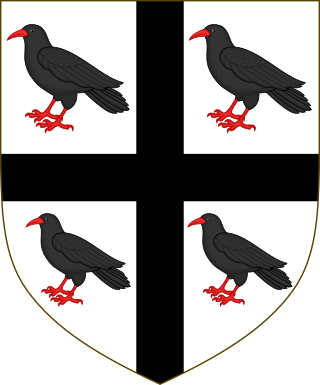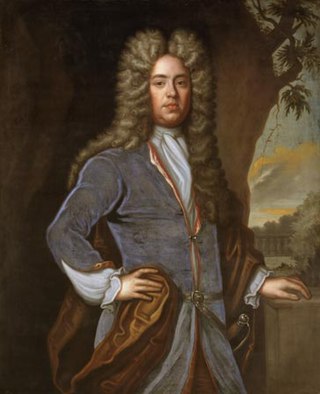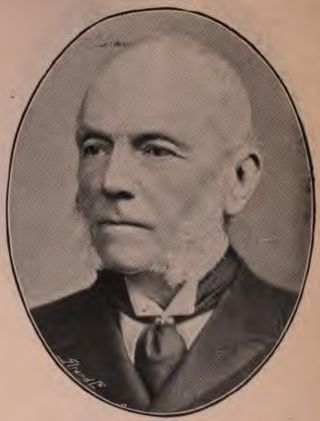Related Research Articles

Viscount Ridley is a title in the Peerage of the United Kingdom. It was created in 1900 for the Conservative politician Sir Matthew White Ridley, 5th Baronet, Home Secretary from 1895 to 1900. He was made Baron Wensleydale, of Blagdon and Blyth in the County of Northumberland, at the same time, also in the Peerage of the United Kingdom. The latter title was a revival of the barony held by his maternal grandfather James Parke, Baron Wensleydale, whose title became extinct upon his death since none of his sons survived him.

Lord Aylmer, Baron of Balrath, in the County of Meath, is a title in the Peerage of Ireland. It was created in 1718 for the naval commander Matthew Aylmer, the second son of Sir Christopher Aylmer, 1st Baronet, of Balrath. Lord Aylmer's son, the second Baron, represented Rye in the House of Commons. The latter's grandson, the fourth Baron, succeeded his kinsman as seventh Baronet, of Balrath, in 1776. The titles remain united. He was succeeded in both titles by his son, the fifth Baron. He was a general in the Army and served as Governor General of Canada from 1830 to 1835. Lord Aylmer assumed by Royal licence the additional surname of Whitworth in 1825 on the death of his uncle Charles Whitworth, 1st Earl Whitworth. On his death, the titles passed to his younger brother, the sixth Baron. He was an admiral in the Royal Navy.

Baron Muskerry is a title in the Peerage of Ireland. It was created in 1781 for Sir Robert Deane, 6th Baronet. He had previously represented County Cork in the Irish House of Commons.
Baron Denham, of Weston Underwood in the County of Buckingham, is a title in the Peerage of the United Kingdom. It was created in 1937 for Sir George Bowyer, 1st Baronet, a Conservative politician who had earlier represented Buckingham in the House of Commons. He had already been created a baronet, of Weston Underwood, in 1933. Bowyer was a great-great-great-grandson of Sir William Bowyer, 3rd Baronet, of Denham Court. As of 2017 the titles are held by his second but only surviving son, the 2nd Baron, who succeeded in 1948. In 1950 he also succeeded his distant relative in the Bowyer baronetcy, of Denham Court. Like his father, the 2nd Baron Denham was a Conservative politician and one of the ninety elected hereditary peers that remain in the House of Lords after the passing of the House of Lords Act 1999.

Earl of Yarmouth is a title that has been created three times in British history, once in the Peerage of England and twice in the Peerage of Great Britain. The first creation came in the Peerage of England in 1679 in favour of the politician and scientist Robert Paston, 1st Viscount Yarmouth. He had already been created Baron Paston and Viscount Yarmouth in the Peerage of England in 1673. He was the son of William Paston, who had been created a Baronet, of Oxnead in the County of Norfolk, in the Baronetage of England in 1641. Lord Yarmouth was succeeded by his son, the second Earl. He notably served as Treasurer of the Household between 1687 and 1689. He had no surviving male issue and the titles became extinct on his death in 1732.
This is a list of people who have served as Lord Lieutenant of Louth.

The Aubrey Baronetcy, of Llantrithyd in the County of Glamorgan, was a title in the Baronetage of England. It was created on 23 July 1660 for John Aubrey. The second Baronet sat as Member of Parliament for Brackley. The third Baronet represented Cardiff. The sixth Baronet represented six different constituencies in Parliament. The title became extinct on the death of the seventh Baronet in 1856.

Clan Moncreiffe is a Highland Scottish clan.

The Appleton Baronetcy, of South Benfleet in the County of Essex, was a title in the Baronetage of England. It was created on 29 June 1611 for Roger Appleton. The title became extinct on the death of the sixth Baronet in 1708.
Viscount of Primrose was a title in the Peerage of Scotland. It was created in 1703 for Sir James Primrose, 3rd Baronet, along with the subsidiary title Lord Primrose and Castlefield. He was the grandson of Archibald Primrose, a Lord of Session under the title Lord Carrington, who in 1651 was created a Baronet, of Carrington in the County of Selkirk, in the Baronetage of Nova Scotia. The peerages became extinct on the death of the third Viscount in 1741. However, the baronetcy was passed on to the late Viscount's cousin James Primrose, 2nd Earl of Rosebery, who became the fifth Baronet of Carrington. He was the son of Archibald Primrose, 1st Earl of Rosebery, fourth son of Sir Archibald Primrose, 1st Baronet. For further history of the baronetcy, see the Earl of Rosebery.
The Betenson Baronetcy, of Wimbledon in the County of Surrey, was a title in the Baronetage of England. It was created on 7 February 1663 for Sir Richard Betenson. He had been knighted in 1624 and served as High Sheriff of Surrey in 1645. In 1678 and 1679 he was High Sheriff of Kent at which time his seat was at Scadbury Manor, near Chislehurst, Kent. The second Baronet was his grandson Edward, High Sheriff of Kent in 1705. He was succeeded by his cousin Edward, whose seat was at Bradburn Place, Sevenoaks, Kent. His son Richard, succeeded as fourth Baronet but died without issue in 1786 when the baronetcy became extinct.
The Rivers, later Rivers-Gay, later Rivers Baronetcy, of Chafford in the County of Kent, was a title in the Baronetage of England. It was created on 19 July 1621 for John Rivers. He was a grandson of Sir John Rivers, Lord Mayor of London between 1573 and 1574. The sixth Baronet assumed the additional surname of Gay in circa 1760. This surname was also used by the seventh Baronet but not by any subsequent Baronets. The title became extinct on the death of the eleventh Baronet in 1870.
The Playters Baronetcy, of Sotterley in the County of Suffolk, was a title in the Baronetage of England. It was created on 13 August 1623 for Thomas Playters and was one of the last baronetcies created by King James I. The second Baronet was Vice-Admiral of Suffolk between 1640 and 1649. The fifth Baronet served as High Sheriff of Suffolk in 1728. The title became extinct on the death of the eighth Baronet in 1832.
The Hoby Baronetcy, of Bisham in the County of Berkshire, was a title in the Baronetage of England. It was created on 12 July 1666 for Edward Hoby, the son of Peregrine Hoby (1602–1679), during his father's lifetime.

Sir Nicholas Slanning, 1st Baronet FRS of Maristow in the parish of Tamerton Foliot, Devon, was an English courtier and politician who sat in the House of Commons between 1667 and 1689.
Sir Humphrey Winch, 1st Baronet was an English politician who sat in the House of Commons between 1660 and 1689.

There have been five baronetcies created for persons with the surname Morgan, two in the Baronetage of England, one in the Baronetage of Great Britain and two in the Baronetage of the United Kingdom. All five creations are extinct.
Sir Roger Bradshaigh, 1st Baronet was an English politician who sat in the House of Commons from 1660 to 1679.

There have been two baronetcies created for members of the Modyford family, both in the Baronetage of England. Both creations are extinct.

Sir Robert Kemp, 2nd Baronet, of Gissing Hall, Norfolk and Ubbeston, Suffolk, was an English politician who sat in the House of Commons between 1675 and 1685.